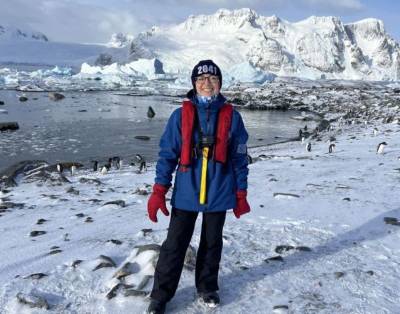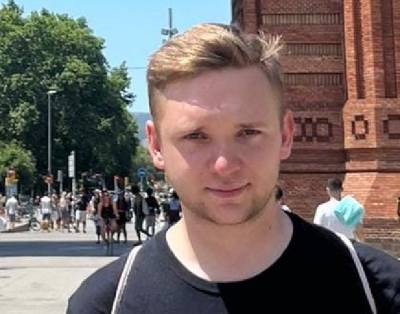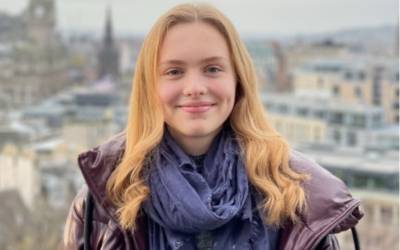MAPS 2022 Undergraduate (MSci) Innovation & Enterprise Competition Prize Winners Announced
31 August 2022
Many congratulations to Elena Preisen-Reis, Matthew Young and Katherine Ellis, winners of the 2022 MAPS Faculty Undergraduate (MSci) Innovation and Enterprise Prize Competition.

Undergraduate (MSci) Innovation and Enterprise Prize Competition
The 2022 Undergraduate Innovation and Enterprise prize was awarded to Elena Preisen-Reis (UCL Physics & Astronomy), Matthew Young (UCL Mathematics) and Katherine Ellis (UCL Chemistry). Their projects were deemed to have an outstanding innovative aspect and a potential economic and societal impact. The competition aimed to motivate entrepreneurial spirit among the students.
Elena Preisen-Reis - UCL Physics & Astronomy
"Investigating the Performance of Lithium-Sulfur Batteries at Low Temperatures for Unmanned Aerial Vehicle Applications in Polar Research"
Elena’s supervisor Professor Chris Howard said:
“I was delighted that Elena won the inaugural MAPS Innovation and Enterprise Prize for her final year project work. Elena showed exceptional motivation and independence throughout her project, from its conception, to developing multiple relationships/collaborations across different departments and faculties. Her project aligned with her passion for sustainability, focused on low-temperature battery technologies with several results/learnings that could have important real-world impact.
The MAPS Innovation and Enterprise Prize is a superb new initiative that rewards and motivates students to focus on the real-world aspects of their research and I look forward to reading about future winners”.
In her response to being awarded the prize, Elena stated:

Before the project, I was unsure whether I wanted to continue in research and stay in academia after completing my degree. However, after experiencing the thrill of being at the forefront of discovery and innovation, my decision to continue researching and pursue a PhD was strongly solidified.
Taking part in the MAPS Undergraduate and Postgraduate Innovation and Enterprise Prize Competition was a very positive experience. I believe, encouraging students to look beyond the short timeframe of their project and at the potential wider impact of their research is vital. Often, we can get so hung up in the theory and numbers that we do not appreciate how valuable scientific innovation and enterprise can be for the development of society and to the benefit of our planet”.
Matthew Young - UCL Mathematics
"An Exploration of Mean First Passage Times using Complex Analytical Techniques"
Matthew’s supervisor Dr Jonathan Marshall stated:
“I think it is incredibly exciting and inspiring for students to realise that their ideas can have a real impact on the world and that the MAPS IE prize competition is a great way to get them to think about this. Matthew’s project was on the development of novel mathematical formulae that describe the average time for a randomly moving particle to escape from a bounded space through gaps in its boundary. I think his idea of using such formulae to develop quantitative measures of exit times for airborne particles from within a room is an excellent one and, moreover, most timely in the wake of the Coronavirus pandemic.
Matthew was a pleasure to work with. He took to the project with great enthusiasm and displayed excellent research skills throughout. I am delighted he has been chosen as a winner of this competition!”
In his response to being awarded the prize, Matthew said:

Katherine Ellis - UCL Chemistry
"Crystalline covalent frameworks based on carbon-carbon bonds"
Katherine's supervisor, Dr Kreso Bucar said:
"Kate’s research project focused on the synthesis of a class of molecular compounds for the development of multi-purpose and selective gas-adsorbent porous materials with unprecedented stability, crystallinity and solution processability. We hope these new materials will fulfil all current requirements for industrial carbon capture (i.e., trapping of carbon dioxide). Also, we hope these new materials will assist with the removal of air pollutants (such as methane and/or sulfur dioxide), the storage of gaseous fuels (e.g., hydrogen) and the harvesting of moisture in water-stressed regions, thereby, offering concrete and executable solutions to the pressing challenges posed by climate change and the global water issues.
Kate’s contribution to our research endeavour was the development of a molecular building block that assures the presence of voids in the target material and thereby enables the selective take-up of various gases and pollutants. Her dedication to the project was fantastic and she tackled numerous challenges confidently and with great dexterity. Her dissertation was a pleasure to read. Having her on our team was a tremendous privilege".
In her response to being awarded the prize, Katherine stated:

 Close
Close

